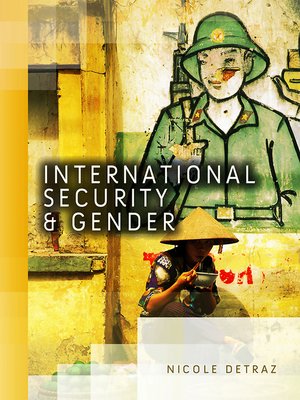
Sign up to save your library
With an OverDrive account, you can save your favorite libraries for at-a-glance information about availability. Find out more about OverDrive accounts.
Find this title in Libby, the library reading app by OverDrive.



Search for a digital library with this title
Title found at these libraries:
| Library Name | Distance |
|---|---|
| Loading... |
What does it mean to be secure? In the global news, we hear stories daily about the wars in Iraq and Afghanistan, about domestic-level conflicts around the world, about the challenges of cybersecurity and social security. This broad list highlights the fact that security is an idea with multiple meanings, but do we all experience security issues in the same way?
In this book, Nicole Detraz explores the broad terrain of security studies through a gender lens. Assumptions about masculinity and femininity play important roles in how we understand and react to security threats. By examining issues of militarization, peacekeeping, terrorism, human security, and environmental security, the book considers how the gender-security nexus pushes us to ask different questions and broaden our sphere of analysis. Including gender in our analysis of security challenges the primacy of some traditional security concepts and shifts the focus to be more inclusive. Without a full understanding of the vulnerabilities and threats associated with security, we may miss opportunities to address pressing global problems.
Our society often expects men and women to play different roles, and this is no less true in the realm of security. This book demonstrates that security debates exhibit gendered understandings of key concepts, and whilst these gendered assumptions may benefit specific people, they are often detrimental to others, particularly in the key realm of policy-making.
In this book, Nicole Detraz explores the broad terrain of security studies through a gender lens. Assumptions about masculinity and femininity play important roles in how we understand and react to security threats. By examining issues of militarization, peacekeeping, terrorism, human security, and environmental security, the book considers how the gender-security nexus pushes us to ask different questions and broaden our sphere of analysis. Including gender in our analysis of security challenges the primacy of some traditional security concepts and shifts the focus to be more inclusive. Without a full understanding of the vulnerabilities and threats associated with security, we may miss opportunities to address pressing global problems.
Our society often expects men and women to play different roles, and this is no less true in the realm of security. This book demonstrates that security debates exhibit gendered understandings of key concepts, and whilst these gendered assumptions may benefit specific people, they are often detrimental to others, particularly in the key realm of policy-making.







